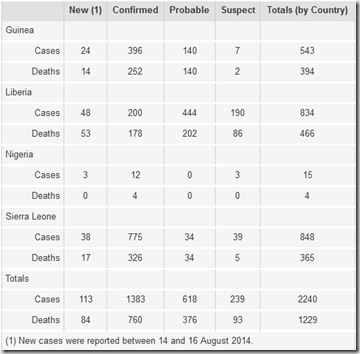# 8969
The World Health Organization has released a new Ebola update, this time adding cases reported between August 14th and August 16th. Theses numbers are believed to only partially represent the situation on the ground in West Africa, as limited reporting and surveillance in many regions, and the public’s fear of reporting illness, likely influence the count.
Of note, after more than two weeks of seeing relatively low counts – Guinea’s numbers jumped by 24 in this latest report, while Nigeria adds three more cases, albeit without details.
There are conflicting media reports regarding these additional Nigerian cases (see Crofsblog for best ongoing Ebola news coverage), and while the number of new cases reported out of Liberia today are half that reported on Friday, the situation there is reportedly getting worse, not better.
Ebola virus disease update - West Africa
Disease outbreak news
19 August 2014Epidemiology and surveillance
Between 14 and 16 August 2014, a total of 113 new cases of Ebola virus disease (laboratory-confirmed, probable, and suspect cases) as well as 84 deaths were reported from Guinea, Liberia*, Nigeria, and Sierra Leone.
Health sector response
The response of WHO and other partners to the Ebola Virus outbreak is continuing to grow in Guinea, Liberia, Nigeria and Sierra Leone. To reduce the likelihood that those who are infected will carry the disease outside their communities, the governments have set up quarantine zones in areas of high transmission including severely-affected cities such as Gueckedou in Guinea, Kenema and Kailahun in Sierra Leone and Foya in Liberia.
This prevents people living in these areas from moving to other parts of the country and potentially increasing EVD transmission. However, it also means that barriers to travel limit their access to food and other necessities. While preventing further transmission of EVD is crucial, it is essential that people in those zones have access to food, water, good sanitation and other basic supplies.
WHO is working with the United Nations World Food Programme (WFP) to ensure people in the quarantine zones receive regular food aid and other non-medical supplies. WFP is now scaling up its programme to distribute food to the around 1 million people living in the quarantine zones in Guinea, Liberia and Sierra Leone.
Food has been delivered to hospitalized patients and people under quarantine who are not able to leave their homes to purchase food. Providing regular food supplies is a potent means of limiting unnecessary movement.
WHO does not recommend any travel or trade restrictions be applied except in cases where individuals have been confirmed or are suspected of being infected with EVD or where individuals have had contact with cases of EVD. (Contacts do not include properly-protected health-care workers and laboratory staff.) Temporary recommendations from the Emergency Committee with regard to actions to be taken by countries can be found at:
IHR Emergency Committee meeting on Ebola outbreak in west Africa
